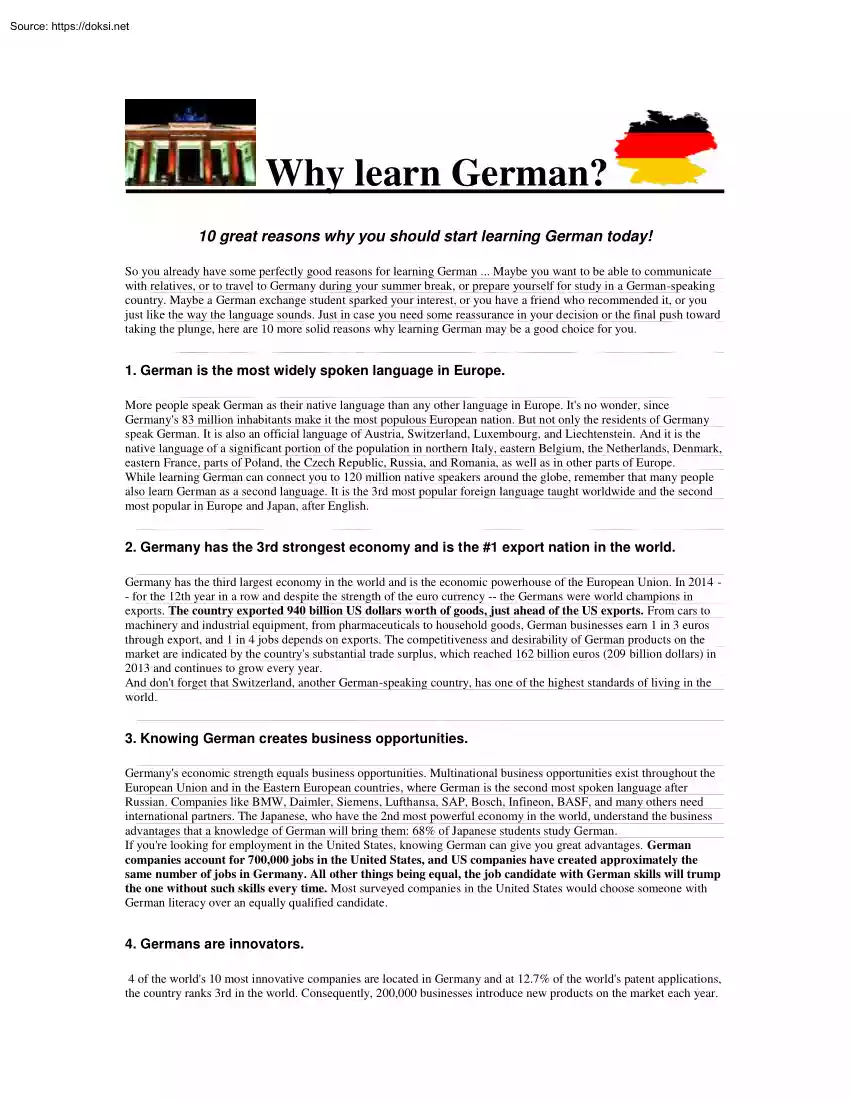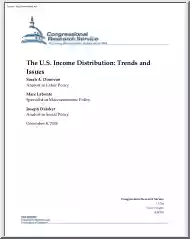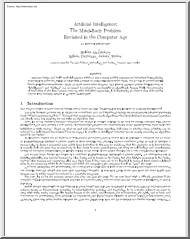A doksi online olvasásához kérlek jelentkezz be!

A doksi online olvasásához kérlek jelentkezz be!
Nincs még értékelés. Legyél Te az első!
Mit olvastak a többiek, ha ezzel végeztek?
Tartalmi kivonat
Why learn German? 10 great reasons why you should start learning German today! So you already have some perfectly good reasons for learning German . Maybe you want to be able to communicate with relatives, or to travel to Germany during your summer break, or prepare yourself for study in a German-speaking country. Maybe a German exchange student sparked your interest, or you have a friend who recommended it, or you just like the way the language sounds. Just in case you need some reassurance in your decision or the final push toward taking the plunge, here are 10 more solid reasons why learning German may be a good choice for you. 1. German is the most widely spoken language in Europe More people speak German as their native language than any other language in Europe. It's no wonder, since Germany's 83 million inhabitants make it the most populous European nation. But not only the residents of Germany speak German. It is also an official language of Austria, Switzerland,
Luxembourg, and Liechtenstein And it is the native language of a significant portion of the population in northern Italy, eastern Belgium, the Netherlands, Denmark, eastern France, parts of Poland, the Czech Republic, Russia, and Romania, as well as in other parts of Europe. While learning German can connect you to 120 million native speakers around the globe, remember that many people also learn German as a second language. It is the 3rd most popular foreign language taught worldwide and the second most popular in Europe and Japan, after English. 2. Germany has the 3rd strongest economy and is the #1 export nation in the world Germany has the third largest economy in the world and is the economic powerhouse of the European Union. In 2014 - for the 12th year in a row and despite the strength of the euro currency -- the Germans were world champions in exports. The country exported 940 billion US dollars worth of goods, just ahead of the US exports From cars to machinery and industrial
equipment, from pharmaceuticals to household goods, German businesses earn 1 in 3 euros through export, and 1 in 4 jobs depends on exports. The competitiveness and desirability of German products on the market are indicated by the country's substantial trade surplus, which reached 162 billion euros (209 billion dollars) in 2013 and continues to grow every year. And don't forget that Switzerland, another German-speaking country, has one of the highest standards of living in the world. 3. Knowing German creates business opportunities Germany's economic strength equals business opportunities. Multinational business opportunities exist throughout the European Union and in the Eastern European countries, where German is the second most spoken language after Russian. Companies like BMW, Daimler, Siemens, Lufthansa, SAP, Bosch, Infineon, BASF, and many others need international partners. The Japanese, who have the 2nd most powerful economy in the world, understand the business
advantages that a knowledge of German will bring them: 68% of Japanese students study German. If you're looking for employment in the United States, knowing German can give you great advantages. German companies account for 700,000 jobs in the United States, and US companies have created approximately the same number of jobs in Germany. All other things being equal, the job candidate with German skills will trump the one without such skills every time. Most surveyed companies in the United States would choose someone with German literacy over an equally qualified candidate. 4. Germans are innovators 4 of the world's 10 most innovative companies are located in Germany and at 12.7% of the world's patent applications, the country ranks 3rd in the world. Consequently, 200,000 businesses introduce new products on the market each year As a nation committed to research and development, Germans are on the frontline of new technologies. Germany exports more high-tech
products than any other country except the U.S and more than 600 firms are active in the cutting-edge field of biotechnology. 115 of these are located in Munich alone The east German city of Dresden has become Europe's microchip center with its more than 765 semiconductor firms. 5. Germans are the biggest spenders of tourist dollars in the world While German workers are highly productive, it is clear that they know how to play just as hard as they work. With ample disposable income and an average of 6 weeks of vacation a year, Germans have the time and the means to travel, . and they do! If you are a world traveler, you are certain to encounter Germans wherever you go since nearly 3 out of every 4 vacations by Germans are spent in other countries. In 2014, they spent a record 96 billion euros on international travel. Year after year, the residents of Germany spend more on foreign travel than those of any other nation 6. The German presence on the Internet supersedes most others
Considering what great innovators the Germans are, it's not at all surprising that they maintain a dominant Internet presence. With 8 million Internet domains, Germany's top-level country domain de is second only to the extension .com That makes German domain names even more popular than those with net, org, info, and biz extensions Even the second-place country extension .uk trails far behind at 37 million domain names 7. Germans form the largest single heritage group in the US If you're American or are interested in American culture, learning German can expand your appreciation and knowledge of U.S history and culture In the year 2010 census, 428 million or 152% of Americans reported having German ancestry, making German Americans the largest single heritage group in the U.S 8. German is not as hard as you think If English is your native language, or if you already know English, then you already have an advantage when it comes to learning German. Because modern
German and modern English both evolved from the common ancestor language Germanic, the two languages share many similarities in both vocabulary and grammar. If you understand any of this Meine Schwester hat braunes Haar. Sie ist intelligent Sie studiert Medizin in Berlin Sie kann gut singen. then you already know some German! In addition, German is spelled phonetically. Once you learn the system of sounds, it is easy to predict how the spoken word is written and how the written word is pronounced. 9. German is required or recommended by many undergraduate and graduate programs German speakers' strong contributions in such a broad array of fields makes the language an important asset in many disciplines. At the University of California, for instance, more majors recommend a knowledge of German as an important supplement than any other language (German: 56 majors, French: 43 majors, Spanish: 21 majors, Japanese: 7 majors). These majors include a wide range of subjects -- from
biology, physics, and chemistry, and engineering to linguistics, religious studies, and art history. Considering the importance of the German language in the fields of publishing and research, it's not surprising that many graduate schools want their graduates to have at least a reading knowledge of German. Knowing German gives graduates access to important research published in German books and professional journals. 10. Germany financially sponsors over 60,000 international exchanges each year While promoting innovation and supporting research within Germany, the Germans also recognize that international cooperation and experience is essential to its continued success as a world leader. In the year 2014 alone, the German Academic Exchange Service supported 67,000 scholars, scientists, educators, and students in periods of international research and study. 43% of these were foreigners who were awarded financial assistance to participate in an exchange in Germany. In addition,
like German students, foreign students directly enrolled in German universities pay no tuition fees
Luxembourg, and Liechtenstein And it is the native language of a significant portion of the population in northern Italy, eastern Belgium, the Netherlands, Denmark, eastern France, parts of Poland, the Czech Republic, Russia, and Romania, as well as in other parts of Europe. While learning German can connect you to 120 million native speakers around the globe, remember that many people also learn German as a second language. It is the 3rd most popular foreign language taught worldwide and the second most popular in Europe and Japan, after English. 2. Germany has the 3rd strongest economy and is the #1 export nation in the world Germany has the third largest economy in the world and is the economic powerhouse of the European Union. In 2014 - for the 12th year in a row and despite the strength of the euro currency -- the Germans were world champions in exports. The country exported 940 billion US dollars worth of goods, just ahead of the US exports From cars to machinery and industrial
equipment, from pharmaceuticals to household goods, German businesses earn 1 in 3 euros through export, and 1 in 4 jobs depends on exports. The competitiveness and desirability of German products on the market are indicated by the country's substantial trade surplus, which reached 162 billion euros (209 billion dollars) in 2013 and continues to grow every year. And don't forget that Switzerland, another German-speaking country, has one of the highest standards of living in the world. 3. Knowing German creates business opportunities Germany's economic strength equals business opportunities. Multinational business opportunities exist throughout the European Union and in the Eastern European countries, where German is the second most spoken language after Russian. Companies like BMW, Daimler, Siemens, Lufthansa, SAP, Bosch, Infineon, BASF, and many others need international partners. The Japanese, who have the 2nd most powerful economy in the world, understand the business
advantages that a knowledge of German will bring them: 68% of Japanese students study German. If you're looking for employment in the United States, knowing German can give you great advantages. German companies account for 700,000 jobs in the United States, and US companies have created approximately the same number of jobs in Germany. All other things being equal, the job candidate with German skills will trump the one without such skills every time. Most surveyed companies in the United States would choose someone with German literacy over an equally qualified candidate. 4. Germans are innovators 4 of the world's 10 most innovative companies are located in Germany and at 12.7% of the world's patent applications, the country ranks 3rd in the world. Consequently, 200,000 businesses introduce new products on the market each year As a nation committed to research and development, Germans are on the frontline of new technologies. Germany exports more high-tech
products than any other country except the U.S and more than 600 firms are active in the cutting-edge field of biotechnology. 115 of these are located in Munich alone The east German city of Dresden has become Europe's microchip center with its more than 765 semiconductor firms. 5. Germans are the biggest spenders of tourist dollars in the world While German workers are highly productive, it is clear that they know how to play just as hard as they work. With ample disposable income and an average of 6 weeks of vacation a year, Germans have the time and the means to travel, . and they do! If you are a world traveler, you are certain to encounter Germans wherever you go since nearly 3 out of every 4 vacations by Germans are spent in other countries. In 2014, they spent a record 96 billion euros on international travel. Year after year, the residents of Germany spend more on foreign travel than those of any other nation 6. The German presence on the Internet supersedes most others
Considering what great innovators the Germans are, it's not at all surprising that they maintain a dominant Internet presence. With 8 million Internet domains, Germany's top-level country domain de is second only to the extension .com That makes German domain names even more popular than those with net, org, info, and biz extensions Even the second-place country extension .uk trails far behind at 37 million domain names 7. Germans form the largest single heritage group in the US If you're American or are interested in American culture, learning German can expand your appreciation and knowledge of U.S history and culture In the year 2010 census, 428 million or 152% of Americans reported having German ancestry, making German Americans the largest single heritage group in the U.S 8. German is not as hard as you think If English is your native language, or if you already know English, then you already have an advantage when it comes to learning German. Because modern
German and modern English both evolved from the common ancestor language Germanic, the two languages share many similarities in both vocabulary and grammar. If you understand any of this Meine Schwester hat braunes Haar. Sie ist intelligent Sie studiert Medizin in Berlin Sie kann gut singen. then you already know some German! In addition, German is spelled phonetically. Once you learn the system of sounds, it is easy to predict how the spoken word is written and how the written word is pronounced. 9. German is required or recommended by many undergraduate and graduate programs German speakers' strong contributions in such a broad array of fields makes the language an important asset in many disciplines. At the University of California, for instance, more majors recommend a knowledge of German as an important supplement than any other language (German: 56 majors, French: 43 majors, Spanish: 21 majors, Japanese: 7 majors). These majors include a wide range of subjects -- from
biology, physics, and chemistry, and engineering to linguistics, religious studies, and art history. Considering the importance of the German language in the fields of publishing and research, it's not surprising that many graduate schools want their graduates to have at least a reading knowledge of German. Knowing German gives graduates access to important research published in German books and professional journals. 10. Germany financially sponsors over 60,000 international exchanges each year While promoting innovation and supporting research within Germany, the Germans also recognize that international cooperation and experience is essential to its continued success as a world leader. In the year 2014 alone, the German Academic Exchange Service supported 67,000 scholars, scientists, educators, and students in periods of international research and study. 43% of these were foreigners who were awarded financial assistance to participate in an exchange in Germany. In addition,
like German students, foreign students directly enrolled in German universities pay no tuition fees




